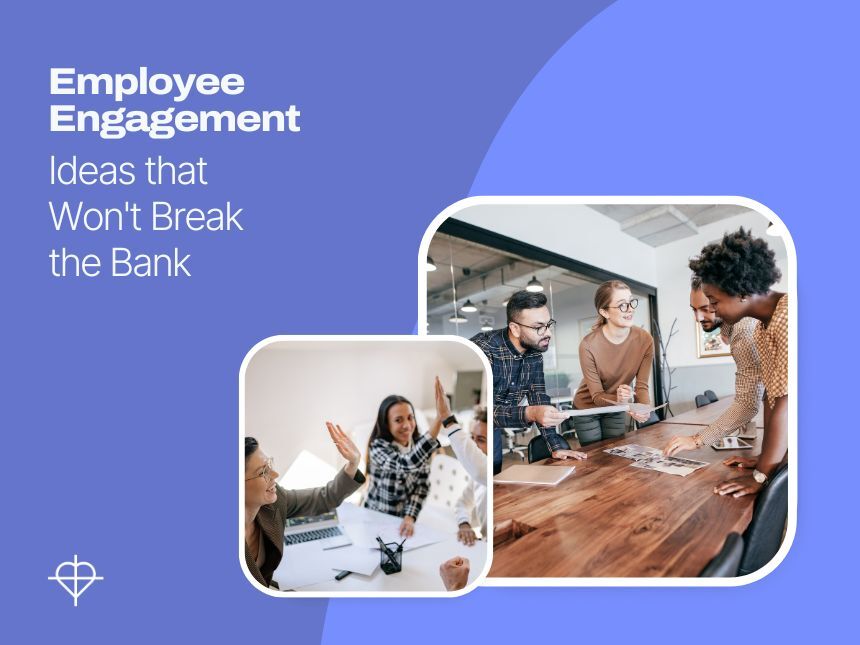Employee Engagement Ideas that Won't Break the Bank
Looking for ways to boost your employees morale or improve their engagement and wellbeing? Search no more, here’s everything to know about what you can do for your staff without breaking the bank. The benefits of having motivated employees and a united team are priceless, as you will soon find out.

In today's competitive business landscape, fostering employee engagement is crucial for organisational success. Engaged employees are more productive, loyal, and contribute to a positive work culture. While many organisations understand the importance of employee engagement, they may hesitate due to concerns about budget constraints. However, enhancing employee engagement doesn't always require a hefty financial investment.
What is Employee Engagement?
Employee engagement refers to the extent to which employees are invested in and committed to their work and the company they work for. It is a measure of the emotional connection and level of involvement that employees have with their jobs, colleagues, and the overall goals of the company.
Engaged employees are motivated, enthusiastic, and dedicated to their work. They are more likely to go above and beyond their job requirements, contribute innovative ideas, and take initiative to achieve the organisation's objectives. They have a sense of ownership and pride in their work and are often more satisfied and fulfilled in their roles.
Employee Engagement Ideas
In this editorial article, we will explore cost-effective and creative employee engagement ideas that can have a significant impact on your workforce without breaking the bank.
Recognition and Appreciation
One of the simplest yet most effective ways to engage employees is through recognition and appreciation. Implementing a formal recognition program or creating opportunities for peer-to-peer recognition can boost morale and motivation. Consider introducing "Employee of the Month" awards, personalised thank-you notes, or public recognition during team meetings. These gestures cost little to nothing but can make employees feel valued and appreciated.
Flexibility and Work-Life Balance
Providing employees with flexibility in their work schedules and promoting work-life balance is a powerful engagement strategy. Allowing flexible hours, remote work options, or compressed workweeks can significantly improve job satisfaction. Employees will appreciate the trust and autonomy, leading to increased loyalty and productivity. Furthermore, organising team-building activities or wellness programs during work hours can promote a healthy work-life balance without straining the budget.
Home Office & Workcasions
Working from home has become increasingly popular, offering benefits like eliminating commutes, providing flexibility, and allowing for a flexible work environment. It saves time and money, enables access to a global talent pool, and enhances work-life balance. However, it also requires addressing challenges like isolation and maintaining effective communication. Overall, remote work offers advantages and can be successful with the right strategies and support.
Professional Development Opportunities
Investing in your employees' professional growth doesn't have to be expensive. Offer in-house training sessions, workshops, or lunch-and-learn sessions where employees can share their expertise. Encourage cross-departmental collaboration and mentorship programs to foster a culture of continuous learning. Additionally, provide access to online resources, webinars, or industry-specific publications that can enhance employees' knowledge and skills without incurring significant costs.
Celebrating Milestones and Achievements
Recognising and celebrating employee milestones, achievements, and team successes can go a long way in building engagement. Organise low-cost celebrations for work anniversaries, project completions, or hitting significant milestones. Whether it's a small team lunch, a handwritten note, or a virtual shout-out, these gestures create a positive and inclusive culture where employees feel proud of their contributions.
Cultural Exchange
This is particularly crucial for companies with multiple branch offices, even in different countries, as it fosters cultural exchange among diverse teams. Cross-Cultural Exchange Programs, regarded as an essential employer branding initiative, offer employees the chance to reside in another country, work in branch offices, acquire new languages, experience different work environments, and embrace cultural differences. This promotes the establishment of an inclusive and accepting corporate culture. Furthermore, such programs grant access to an international talent pool, enabling companies to attract skilled workers from various nations. Through knowledge and perspective sharing, teams can develop intercultural competencies and enhance their professional growth.
Mentoring Programs
Digital mentoring programs for employees offer a virtual platform where individuals from different locations or departments can connect and receive guidance. These programs facilitate professional development by providing the proper support, fostering connections between experienced professionals and up-and-coming talent, and overcoming geographic or organisational barriers to learning and growth.
Employee Gifts & Giveaways
Employee gifts and giveaways play a significant role in improving employee engagement and wellbeing. These gestures demonstrate appreciation for employees' hard work and dedication, fostering a positive work environment. Thoughtful gifts or giveaways serve as tangible reminders of the organisation's recognition and value of its employees. They can range from small tokens of appreciation to larger rewards for seasonal events such as Christmas or Easter. Such gestures not only boost morale but also contribute to employee motivation, loyalty, and overall job satisfaction. By investing in employee gifts and giveaways, organisations strengthen their relationships with their workforce, leading to increased productivity and a sense of belonging within the company.
The Benefits of Enhancing Employee Engagement and Wellbeing
Increasing employee engagement and wellbeing can bring several benefits to organisations. Here are some of the key advantages:
- Enhanced Productivity: Engaged and well-supported employees are more likely to be motivated, focused, and committed to their work. They tend to be more productive and perform at higher levels, which can lead to improved overall productivity.
- Increased Job Satisfaction: When employees feel engaged and their well-being is prioritised, they generally experience higher levels of job satisfaction. This satisfaction can positively impact their attitude, morale, and willingness to go the extra mile for the organisation.
- Reduced Turnover: Engaged and well-supported employees are less likely to seek opportunities elsewhere. By investing in employee engagement and well-being, organisations can reduce turnover rates and the associated costs of recruitment, onboarding, and training new employees.
- Improved Retention of Talent: Engaged employees are more likely to develop a strong sense of loyalty towards the organisation. They are also more inclined to stay with the company for the long term, providing stability and reducing the loss of valuable expertise and knowledge.
- Enhanced Collaboration and Teamwork: Engaged employees tend to have better relationships with their colleagues and are more likely to collaborate effectively within teams. This fosters a positive work environment, encourages knowledge sharing, and promotes innovation.
- Higher Customer Satisfaction: Engaged and satisfied employees are more likely to provide excellent customer service. They tend to be more attentive, responsive, and proactive in meeting customer needs, leading to increased customer satisfaction and loyalty.
- Healthier Work Environment: Focusing on employee wellbeing promotes a healthier work environment. Companies that actively support employee physical and mental health can reduce stress levels, improve work-life balance, and create a positive culture that values employee welfare.
- Enhanced Employer Branding: Companies that prioritise employee engagement and wellbeing tend to have a positive employer brand. This can attract top talent, as prospective employees are more likely to be attracted to workplaces that are known for taking care of their employees.
- Increased Innovation and Creativity: Engaged and happy employees are more likely to contribute innovative ideas and solutions. When employees feel valued, supported, and encouraged to take risks, they are more willing to think creatively, propose new approaches, and drive innovation within the organisation.
- Positive Culture: By focusing on employee engagement and well-being, companies can cultivate a positive culture characterised by trust, open communication, and collaboration. This culture can have a cascading effect, attracting and retaining top talent while contributing to overall success.
It is worth noting that employee engagement and wellbeing are interconnected, and organisations need to adopt a holistic approach to achieve these benefits. Strategies may include creating a supportive work environment, providing opportunities for growth and development, recognising and rewarding employees' contributions, promoting work-life balance, and offering resources for physical and mental health support.
To sum everything up, engaging employees doesn't always require a significant financial investment. By implementing these cost-effective ideas, organisations can foster a positive work environment, boost morale, and improve overall employee satisfaction. Recognition and appreciation, flexibility, professional development opportunities, employee feedback, and celebrating milestones are all effective ways to engage employees without straining the budget. Remember, the key lies in creating a culture where employees feel valued, heard, and part of something meaningful.




.png)
.png)
.png)












